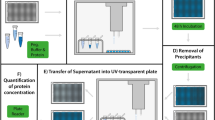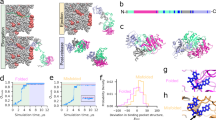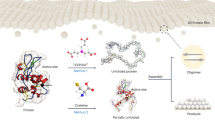Abstract
THE ease with which ionophoretic separations of amino-acids and lower peptides can be carried out in a rectangular slab of silica jelly1 suggested that a similar technique might be useful for separating the proteins. The first problem was to find a convenient jelly which would allow the free migration of large molecules. The unsuitability of silica jelly for this purpose was shown when an attempt was made to cause hæmoglobin to migrate into its surface. Unfortunately, the protein became fixed less than 1 mm. from the surface of entry. A 1 per cent agar jelly, on the other hand, was found to allow the protein to migrate.
This is a preview of subscription content, access via your institution
Access options
Subscribe to this journal
Receive 51 print issues and online access
$199.00 per year
only $3.90 per issue
Buy this article
- Purchase on SpringerLink
- Instant access to full article PDF
Prices may be subject to local taxes which are calculated during checkout
Similar content being viewed by others
References
Consden, R., Gordon, A. H., and Martin, A. J. P., Biochem. J., 40, 33 (1946).
Longsworth, L. G., Cannan, R. K., and MacInnes, D. A., J. Amer. Chem. Soc., 62, 2580 (1940).
Author information
Authors and Affiliations
Rights and permissions
About this article
Cite this article
GORDON, A., KEIL, B. & ÅEBESTA, K. Electrophoresis of Proteins in Agar Jelly. Nature 164, 498–499 (1949). https://doi.org/10.1038/164498a0
Issue date:
DOI: https://doi.org/10.1038/164498a0
This article is cited by
-
The Laboratory Technology of Discrete Molecular Separation: The Historical Development of Gel Electrophoresis and the Material Epistemology of Biomolecular Science, 1945–1970
Journal of the History of Biology (2009)
-
Eiwei�chemische und immunologische Untersuchungen bei Hautkranken
Archiv f�r Klinische und Experimentelle Dermatologie (1965)
-
Étude Électrophorétique Et Immunochimique Comparée Des Antigènes De Quelques Levures Du GenreCandida (C. Albicans, C. Stellatoidea, C. Tropicalis, C. Zeylanoides, C. Krusei, C. Pseudotropicalis, C. Macedoniensis)
Mycopathologia et Mycologia Applicata (1962)
-
Immunoelectrophoretic Investigations on the Rlood Serum of Adult Pigs
Acta Veterinaria Scandinavica (1961)



